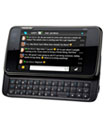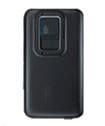The Nokia N900 goes by a number of names; for example, it has been codenamed Nokia Rover. However, none of these names impact what is a very sleek and stylish mobile computer. While the Apple Tablet is eagerly expected, along with the LG netbook, Nokia seems to have stolen a march on them all with the impressive N900.
Look, Design, Feel (/10)

The first impression of the N900 is that the device is sleek beyond belief. Of course, Apple will find a way to make the slimmest mobile computer, but as of now, the N900 is immensely desirable.
The device is has a resistive touch screen, with a slide-out QWERTY keyboard. The keyboard isn't of the same dimensions as the screen, therefore it merely juts out a little without adding greatly to the actual dimensions of the phone.
The phone isn't too big either, measuring 110.9 × 59.8 × 18 (19.55 at the thickest portion) mm. It is a little heavier than the standard phone weighing approximately 180 gm.
Features (/10)

The features on the N900 stack up formidably, whether hardware or software. The phone is powered by Maemo 5, the Linux-compatible Nokia operating system.
Starting with hardware first, earlier we mentioned that the N900 had a resistive touch screen. This particular technology opens up the touch screen to multi-touch input and the various other related advantages. The screen is substantially big, measuring 3.5 mm. The screen resolution is excellent for a mobile device at 800 x 480 pixels. With that kind of resolution, the video capabilities of the phone are sizeable to say the very least.
Users are unlikely to ever run out of storage space on the N900, with 1 GB of internal application memory, 32 GB storage space and the option to extend it through a microSD card of up to 16 GB.
The camera is 5 megapixels with a Carl Zeiss lens, which is a slight disappointment because the same camera was available on Nokia devices more than a year ago. The camera has autofocus and can zoom up to 3X.
Moving into the software components of the Internet tablet, this is where the new device really shines. According to the designers, the purpose of the N900 was to provide desktop computing on the go.
Towards this end, the new device has multiple desktops. While this is not a new concept, the implementation is different. Each desktop is entirely customizable with widgets, contacts, calendar data, etc.
The browser incorporates Mozilla technology, and therefore can handle the same kind of webpages that one can view on a standard desktop computer.
There are a few gimmicks inserted in various places, designed to make the device slick and user-friendly. While they are great, they aren't big enough to document in a review.
Connectivity (/10)
Connectivity will never be a issue for the N900 user, as there are many options available to them: the phone is quad-band GSM EDGE and also WCDMA at the same time. It supports GPRS, HSPA, and WLAN.
The standard Nokia attachments come packaged with the handset, including the TV-out Nokia cable, the AV connector and a microUSB connector.
The phone of course has Bluetooth and GPS functionality, whereas Nokia has finally decided to retire the infrared port.
Performance (/10)
There seems to be no mention of the total battery life of the phone, although the hardware is pretty heavy duty.
Performance will be a complete breeze with 600 MHz processor and 1GB of internal application storage. The phone has 256 MB RAM and 768 virtual memory, which essentially means that at any given point of time the memory can expand up to 1 GB. 1 GB RAM is a phenomenal addition, and on that basis alone the phone deserves full marks on its performance.
Value for Money (/10)
The Nokia N900 is frighteningly expensive smartphone. While the phone is sleek and has great features, it is very unlikely anyone is going to shell out that sort of cash for a phone. None of the features is truly revolutionary among devices in general, even though Nokia has previously not released anything remotely like it.
Pros
+ The phone is beautiful, with hardware and software QWERTY keyboards and a resistive touch screen
+ It is powered by Maemo 5, the latest open source, Linux-compatible Nokia operating system.
+ It has massive amounts of storage space and RAM.
+ Mozilla-powered web browser
Cons
- The camera could have potentially been better, as 5 megapixel Carl Zeiss lens ones were available in Nokia 95s two years ago.
- The phone is very expensive, and does not seem to have features that can justify the price at all.
